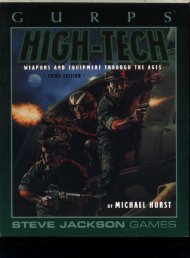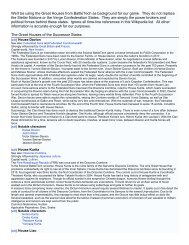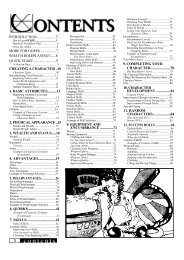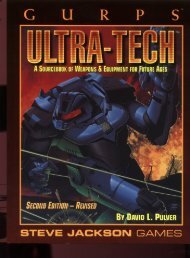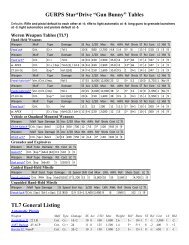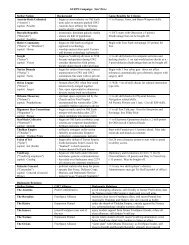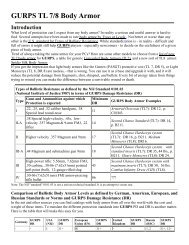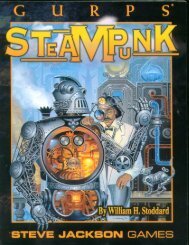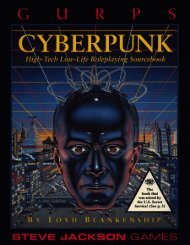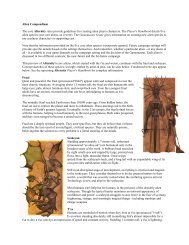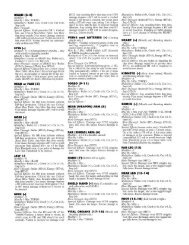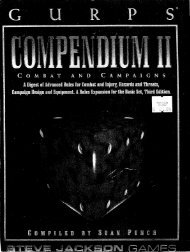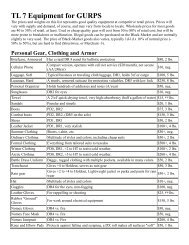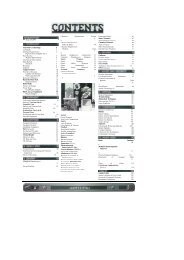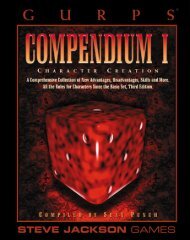You also want an ePaper? Increase the reach of your titles
YUMPU automatically turns print PDFs into web optimized ePapers that Google loves.
Mana<br />
Mana is the energy behind magic. <strong>Magic</strong><br />
will work only if the mana of the game world<br />
(or the specific area) allows it. Mana is rated as<br />
follows:<br />
Very high mana: Anyone can cast spells. if<br />
he knows them. Energy spent by a mage is<br />
fully renewed every turn! However, any slip is<br />
likely to be disastrous. Even an ordinary failure<br />
is treated as a “critical failure” - and critical<br />
failures produce spectacular disasters. Very<br />
high mana is extremely rare.<br />
High mana: Anyone can cast spells, if he<br />
knows them. This condition is rare in most<br />
worlds, but some game worlds have High Mana<br />
throughout them.<br />
Normal mana: Only mages can cast spells.<br />
These spells work normally, according to all<br />
rules given in this section. This is the “default”<br />
condition for fantasy game worlds . . . mages<br />
use magic, others don’t.<br />
Low mana: Only mages can cast spells, and<br />
all magic use is at -5; this also affects energy<br />
cost, time, and ritual required to cast a spell.<br />
Power of magical items is also at -5 - so items<br />
with Power below 20 will not work at all.<br />
However, critical spell failures have very mild<br />
effects or no effect at all. Our Earth is a<br />
low-mana world. (The GM may, if he wishes,<br />
add gradations of mana between low and<br />
normal - e.g., areas on the boundary might<br />
shade from -1 to -4.)<br />
No mana: No one can use magic at all.<br />
<strong>Magic</strong> items do not function (but regain their<br />
powers when taken to an area with mana).<br />
No-mana conditions occur in isolated spots in<br />
magical worlds. Some entire game worlds may<br />
have no mana, making magic use impossible.<br />
Certain very powerful spells can change the<br />
level of mana in an area - see p. 63.<br />
Sensing Mana<br />
A mage does not automatically know the<br />
mana level of an area, but whenever he crosses<br />
a boundary between mana types, he may roll to<br />
detect the change, and whether it was up or<br />
down. This roll is based on Magery only:<br />
Magery 1 gives a roll of 8 or less, Magery 2<br />
gives a roll of 11 or less, Magery 3 gives a roll<br />
of 13 or less. The mage rolls at +3 if he was<br />
specifically trying to “feel” the boundary.<br />
Critical success will tell everything about the<br />
local mana!<br />
A little experimentation, or an Analyze<br />
<strong>Magic</strong> spell cast for the purpose, will easily<br />
determine exact mana level.<br />
Types of Mana<br />
It is also possible to have localized areas<br />
where the mana is especially favorable (or<br />
unfavorable) to certain types of magic. See p.<br />
94.<br />
Various modifiers will add to or subtract from the caster’s basic skill with the<br />
spell. The modifiers depend on the class of spell - see p. 10/B149.<br />
A successful roll means the spell was cast, and the spell’s energy cost (see<br />
below) is marked off your ST (as fatigue) or your HT (as injury).<br />
A critical success (a 3 or 4; a 5 if your effective skill was 15+; a 6 if your<br />
effective skill was 16+) means the spell worked especially well. The nature of<br />
this great success is left to the GM, who should be both generous and creative.<br />
There is never an energy cost if you get a critical success when you cast a spell.<br />
A failed roll means the spell was not cast. If a successful use of the spell<br />
would have cost energy, the caster loses one energy point. If the spell would not<br />
have required energy, the caster loses nothing.<br />
A critical miss (any roll of 18; a 17 if your skill is under 16; or any roll 10<br />
over your effective skill) means that the energy cost of the spell was spent, but<br />
the spell failed badly. A table of “backfire” results is provided below. However,<br />
the GM may improvise any “backfire” that he finds appropriate and amusing, as<br />
long as he does not actually kill the caster.<br />
If this seems arbitrary or unfair . . . it is! Again, magic is fickle. Any time<br />
you cast a spell, you are using powers you do not fully understand, and exposing<br />
yourself to the whim of the fates - as represented by the GM.<br />
Critical Spell Failure Table<br />
Roll 3 dice. The GM does not have to use this table; he is free to improvise<br />
(though improvisations should be appropriate to the spell and the situation). If a<br />
result on this table is inappropriate, or if it happens to be the result that the caster<br />
actually intended, roll again.<br />
3 - Spell fails entirely; caster takes 1 die of damage.<br />
4 - Spell is cast on spellcaster.<br />
5 - Spell is cast on one of the caster’s companions (roll randomly).<br />
6 - Spell is cast on a nearby foe - roll randomly.<br />
7 - Spell produces only a whining noise and an awful odor of brimstone.<br />
8 - Spell goes at someone or something other than its intended target -friend, foe,<br />
or random item. Roll randomly, or GM makes an interesting choice.<br />
9 - Spell fails entirely; caster takes 1 hit of damage.<br />
10 - Spell fails entirely; caster is stunned (IQ roll to recover).<br />
11 - Spell produces nothing but a loud noise and a flash of colored light.<br />
12 - Spell produces a weak and useless shadow of its intended effect.<br />
13 - Spell produces the reverse of the intended effect.<br />
14 - Spell produces the reverse of the intended effect, on the wrong target (roll<br />
randomly).<br />
15 - Nothing happens except caster temporarily forgets spell - make an IQ roll<br />
after a week, and again each following week, until he remembers. Caster can<br />
study spell during this time, but it is a waste of his time.<br />
16 - Spell seems to work, but it is only a useless illusion.<br />
17 - Spell fails entirely; caster’s right arm is crippled - 1 week to recover.<br />
18 - Spell fails entirely. A demon (see p. 113/B154) appears and attacks the<br />
caster. This will not happen if, in the GM’s opinion, the caster and spell were<br />
both lily-white, pure good in intent. Instead, roll again.<br />
PRINCIPLES OF MAGIC<br />
- 6 -



